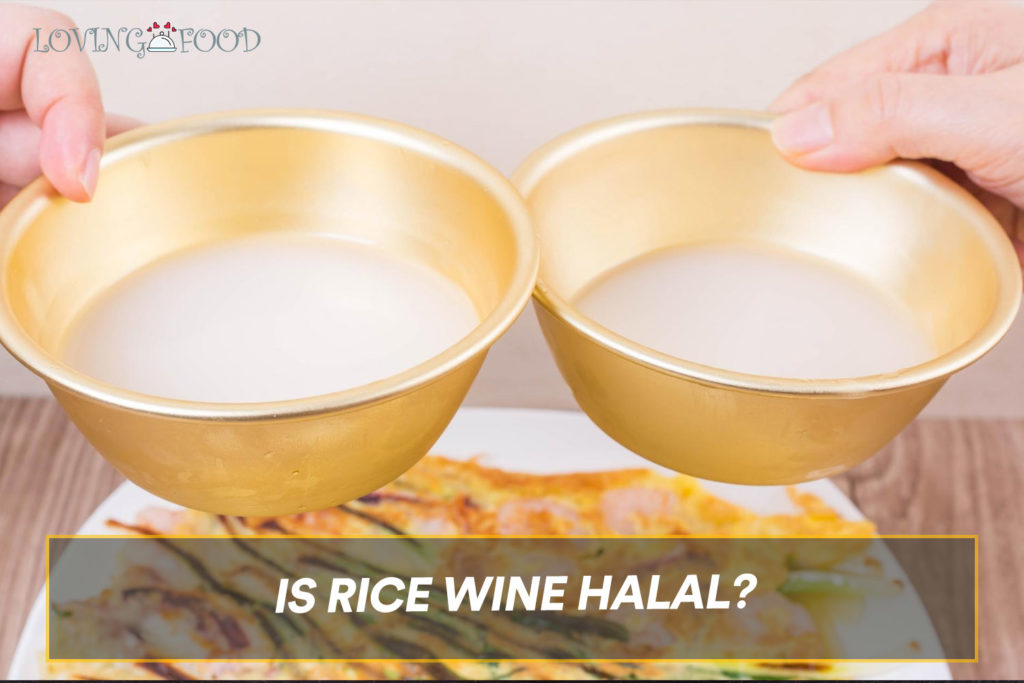Rice wine has been part of history for centuries. It has played an important role in China since it was founded. Quite a lot of things are open to interpretation based on different religions and some foods on under this. There are various types of rice wine and although it’s commonly used in dishes or marinades but can be enjoyed as an alcoholic beverage as well.
The formula used in rice wine is going to influence whether it is halal or not. Rice wine is not exactly made with alcohol but the process of fermenting rice starches using yeast, fungi, and lactic acid bacteria is what produces alcohol regardless, the alcohol has been evaporated so likely to not be considered halal.
Rice is a really sweet sauce, and it is often used by chefs to improve the taste of a dish. Vinegar and rice wine are made in similar ways and as a Muslim, it’s important to know if this is not intoxicating, and can be used safely.
Some foods are cut halal and that might often be a result of certain ingredients in them. Rice wine is frequently used in cooking and although it is low in alcohol but doesn’t change the fact that it contains a certain amount. So, read on to know if rice wine is halal and other information you need.
NEW READ: Is Tofu Halal? (What You Should Know)
How Is Rice Wine Made?
Rice wine is known as an alcoholic beverage, and it was first made in China before the practice was spread to Japan and East Asia Countries. There are various kinds of rice wine, they are mainly fermented from rice, but cereals can be used as well.
Rice starch is converted into sugar to make rice wine, and it is ideal for cooking and drinking.
Rice wine is made by the conversion of starch into sugar using the action of acids and enzymes. Rice wine can be made at home with the simple process of fermenting your rice. It contains an alcohol content of 18–25% ABV.
While most wines are made from fruits, rice wine as the name implies is made from rice. Rice is fermented and sugars are being transformed into alcohol with the presence of yeast in it.
Halal Explained
Halal is an Arabic word, and it means lawful or permitted. In Islam, some foods or drinks are regarded as halal which will mean they are not lawful or permitted according to Islamic laws. The Koreans defined halal as foods that adhere to Islamic law.
Generally, halal refers to the things that are permissible or lawful under Islamic law. This is also used in referring to certain actions and behavior that are not permitted in Islam.
NEW: Is Flamin’ Hot Cheetos Halal? (Definitive Answer)
Is Rice Wine Really Halal?
Since rice wine is an alcoholic beverage and although the alcohol content in it is small, it can still be said to not be halal in Islamic law. Rice wine has up to 50% alcohol content hence if used in cooking and a Muslim is aware of this, it is not halal, so the food is best not consumed.
Rice wine plays an important role in China and many Chinese restaurants use it in cooking. It is a major ingredient in some Japanese cuisine as well and according to Islamic law, a Muslim who knows this shouldn’t consume the food.
Generally, Muslims do not take alcohol, it is considered not halal and since rice wine contains a percentage of that then it is not halal as well. Chefs like to use rice wine due to its high quality however you can switch to non-alcoholic alternatives like milk or yogurt or some studies claim you can add lots of sugar to tame the wine in rice wine.

Is Rice Wine Vinegar Halal?
Yes, rice wine vinegar and generally all pure vinegar are halal which means they can be consumed by Muslims. Rice wine vinegar is fermented just like rice wine but it undergoes an additional process that removes the alcohol in it and ends up producing acetic acid.
Apparently, rice wine contains alcohol but the further process now removes it from it.
Rice wine vinegar is mild but has a sweet acidic flavor and as the name implies, it has traits of vinegar more than alcohol. Vinegar is a well-known basic foodstuff so if there is no deliberate treatment of rice wine vinegar then it is permissible to drink.
What Is The Difference Between Sake And Rice Wine?
In a way, sake and rice wine can be used interchangeably, however, both are not the same. Sake can be fermented while rice wine can be distilled or fermented. Both are grain alcohol and are derived from rice, but sake doesn’t contain any sugar while rice wine does contain sugar.
For the Japanese though, sake and rice are the same. Rice wine in many Asian countries is brewed from certain rice called glutinous rice while sake can come from cereal or any other type of rice.
What Can I Substitute For Rice Wine?
What can be used in substituting rice wine depends partly on what the recipe calls for.
Rice wine can be enjoyed as an alcoholic beverage and in cooking, but having considered it not halal, below are perfect substitutes for it that are not alcohol-based.
- White grape juice
- Lemon or lime juice
- Sherry vinegar
- Apple juice
- Chicken stock
- Vegetable stock.
Frequently Asked Questions
Is rice wine vinegar halal?
Rice wine vinegar is also known as rice vinegar, and it is fermented from rice just like rice wine, but the process is different, and the manufacturing method is alcohol-based, so it is not halal. Rice vinegar is not alcoholic, but it is a kind of acetic acid that can be classified into alcohol groups.
Can Muslims use rice wine vinegar?
Rice wine vinegar is gotten just the same way as vinegar, but it is a certain type of acetic acid if it is formulated the same way as vinegar. This contains traces of alcohol but has features of vinegar instead of wine.
Is it halal to use wine in cooking?
Any form of alcohol is not allowed so if this is an alcoholic wine then it is not halal. The prohibition of alcohol applies to using it in any form.
Final Thoughts
The formula used in making rice wine can determine if it’s halal or not however note that Muslim law frowns upon taking alcohol, so in place of rice wine, choose white wine vinegar or any of the mild non-alcoholic based substitutes listed above.
In addition, Japanese rice wine vinegar should be steered clear of unless you are sure it is fermented specifically with no alcohol content.








